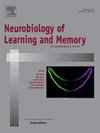半夜睡眠限制后观察到的记忆损伤不是由工作记忆、注意力或抑制控制机制介导的
IF 1.8
4区 心理学
Q3 BEHAVIORAL SCIENCES
引用次数: 0
摘要
睡眠限制是现代社会日益严重的问题,因此揭示其神经认知后果至关重要。尤其是陈述性记忆会受到睡眠不足的负面影响,因为它严重依赖海马体,而海马体是已知易受睡眠不足影响的大脑区域。研究表明,即使是半个晚上的睡眠限制也足以导致海马依赖形式的记忆受损。然而,记忆表现至少在某种程度上依赖于其他认知功能。当前研究的目的是揭示在动物研究中观察到的一晚睡眠剥夺后观察到的记忆缺陷是否会转化为人类,以及这些影响是否由其他认知领域的损伤介导。我们假设记忆范式会受到影响,但由于睡眠限制的短暂性,这种影响不会由其他认知功能介导。为此,55名健康的参与者进行了一组测试,包括在正常睡眠或急性部分睡眠限制后测量语言学习、空间记忆、注意力、工作记忆和反应抑制的范式。研究结果显示,两项海马体依赖性记忆测试都出现了损伤,而在其他认知领域没有发现睡眠不足的负面影响。总之,我们的数据表明,在半夜睡眠剥夺后观察到的记忆表现缺陷不是由注意力(警报、定向和执行控制)、工作记忆或运动抑制控制机制的损害介导的。本文章由计算机程序翻译,如有差异,请以英文原文为准。
Memory impairments observed after a half night sleep restriction are not mediated by working memory, attention, or inhibitory control mechanisms
Sleep restriction is a growing issue in our modern society and thus it is crucial to uncover its neurocognitive consequences. Especially declarative memory is negatively affected by sleep loss due to its critical dependence on the hippocampus, a brain area known to be susceptible to sleep loss. Studies have shown that even a half night sleep restriction is sufficient to induce impairments in a range of hippocampus-dependent forms of memory. Nevertheless, memory performance is, at least to some extent, dependent on other cognitive functions. The aim of the current study was to reveal whether memory deficits observed after one night sleep deprivation, as observed in animal studies, translate to man, and whether these effects are mediated by impairments in other cognitive domains. We hypothesized that the memory paradigms would be affected but that, due to the short nature of the sleep restriction, this effect would not be mediated by other cognitive functions. To this end, fifty-five healthy participants conducted a test battery containing paradigms measuring verbal learning, spatial memory, attention, working memory, and response inhibition after a night of regular sleep or acute partial sleep restriction. The results of the study showed an impairment in both hippocampus-dependent memory tests, while no negative consequences of sleep deprivation were revealed on the other cognitive domains. In conclusion, our data indicate that the observed deficit in memory performance after a half night sleep deprivation is not mediated by impairments in attention (alerting, orienting, and executive control), working memory, or motor inhibitory control mechanisms.
求助全文
通过发布文献求助,成功后即可免费获取论文全文。
去求助
来源期刊
CiteScore
5.10
自引率
7.40%
发文量
77
审稿时长
12.6 weeks
期刊介绍:
Neurobiology of Learning and Memory publishes articles examining the neurobiological mechanisms underlying learning and memory at all levels of analysis ranging from molecular biology to synaptic and neural plasticity and behavior. We are especially interested in manuscripts that examine the neural circuits and molecular mechanisms underlying learning, memory and plasticity in both experimental animals and human subjects.

 求助内容:
求助内容: 应助结果提醒方式:
应助结果提醒方式:


